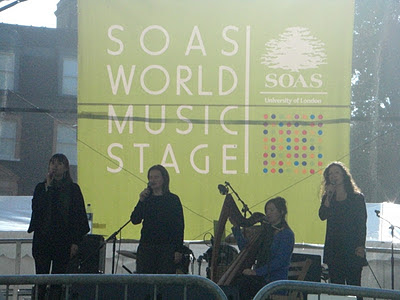I didn't have time to write it here, but I was invited to participate at an African Union's Workshop, as a representative for Vox Africa, on Peace, Security and the media.
Arriving in Addis Ababa with a video camera was not easy but after hours of waiting and a written authorisation, we managed.
I am not a big fan of official meetings organised by huge international bodies, but as usual it is a good occasion to meet interesting journalists from all over the continent and actors of the African diplomacy.
First day is summarised in this press release if you're interested...
PRESS RELEASE Nº141/2011
 Addis Ababa, 2 November 2011 – A high level media workshop on the African Peace and Security Architecture (APSA) started at the African Union Commission (AUC) in Addis Ababa, with the aim of improving communication on the issue of peace and security in Africa and to see the creation of a journalists’ network for peace.
Addis Ababa, 2 November 2011 – A high level media workshop on the African Peace and Security Architecture (APSA) started at the African Union Commission (AUC) in Addis Ababa, with the aim of improving communication on the issue of peace and security in Africa and to see the creation of a journalists’ network for peace.
“I wish to see the story of African events finding the space that it deserves in the international media. Stories that give hope and esteem to African citizens”, said the Chairperson of the AU Commission Dr Jean Ping, in an address delivered on his behalf by the Commissioner of Rural Economy and Agriculture Mrs Rhoda Peace Tumusiime at the official opening ceremony of the workshop today.
Mr Ping’s message highlighted the crucial importance of the media in “preaching the virtues of peace and warning on the dangers of war”. “Indeed the media occupy a key position in the transmission of information to Africans and to the outside world”, he said.
The media and the AU Commission, he added, despite their different scopes, have the same mission i.e. to bring the voice of Africa to the fore and to express African positions. “African media are the voice of Africa”.
The Chairperson also took the opportunity to reiterate the AU Commission’s commitment to freedom of expression and the right to information. These rights are guaranteed in the African Charter on Human and People’s Rights which states that: “everyone has the right to information” and that “everyone has the right to express and disseminate his opinions within the law”. The Chairperson’s statements in this regard are complementary to the work being done by the Commission’s Directorate of Information and Communication, which is working hand in hand with communication and media specialists across the continent to ensure freedom of expression and the right to information as guided by the AU instruments. The Directorate also promotes interaction between the AU and the media fraternity.
 The workshop will enable participants to discuss with the relevant authorities on how the African Peace and Security Architecture functions. Presentations will be made on the various activities and interventions in the area of peace and security. It will allow the AU Commission to improve its understanding of the media, which it views as partners in the promotion of peace and security.
The workshop will enable participants to discuss with the relevant authorities on how the African Peace and Security Architecture functions. Presentations will be made on the various activities and interventions in the area of peace and security. It will allow the AU Commission to improve its understanding of the media, which it views as partners in the promotion of peace and security.The workshop is also expected to lead to the creation of a network of journalists for peace and security in Africa (NetPeace). In this regard it will elect an executive board and reach agreement on a calendar of meetings. The network will be closely linked to existing networks.
Dr Ping also announced the imminent establishment of a program of learning and information (AID) on APSA, with the aim to allow all African citizens to have easy access to knowledge of the continental instruments for the promotion and maintenance of peace.
The workshop’s opening ceremony was also addressed by the Director of Information and Communication at the AU Commission Mrs Habiba Mejri Cheikh who highlighted that, in its constant search for better information flow, the Directorate has organised a number of meetings for journalists from the five regions of the continent. She said the workshop is opportune, coming as it is in the immediate aftermath of significant events on the continent, such as the Arab Spring, the events in Cote D’Ivoire and the drought in Horn of Africa. Acknowledging that the AU position and intervention was not clearly portrayed to the world in all cases, she said “we have realised this and we are re doubling our efforts with the media so that we can understand the reasons why. We want to see how we can redress the situation”.
Also speaking at the workshop’s opening ceremony was Mr Christopher Hall, Counsellor and Advisor at the Embassy of Canada, which is supporting the DIC and the Department of Peace and Security to improve continental awareness and understanding of the AU’s involvement in peace and security issues. Mr Hall is also the representative of the Francophone Research Network on Peace Operations (ROP).
The workshop is being attended by high level personalities in the African media. The Chief of Staff in the Burequ of the Chairperson of the AUC also attended the opening ceremony. It was organised by the Directorate of Information and Communication and the Department of Peace and Security in partnership with the Francophone Research Network on Peace Operations (ROP).
WZM/






































